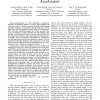Free Online Productivity Tools
i2Speak
i2Symbol
i2OCR
iTex2Img
iWeb2Print
iWeb2Shot
i2Type
iPdf2Split
iPdf2Merge
i2Bopomofo
i2Arabic
i2Style
i2Image
i2PDF
iLatex2Rtf
Sci2ools
CORR
2016
Springer
2016
Springer
Auto-Tuning Dedispersion for Many-Core Accelerators
—Dedispersion is a basic algorithm to reconstruct impulsive astrophysical signals. It is used in high sampling-rate radio astronomy to counteract temporal smearing by intervening interstellar medium. To counteract this smearing, the received signal train must be dedispersed for thousands of trial distances, after which the transformed signals are further analyzed. This process is expensive on both computing and data handling. This challenge is exacerbated in future, and even some current, radio telescopes which routinely produce hundreds of such data streams in parallel. There, the compute requirements for dedispersion are high (petascale), while the data intensity is extreme. Yet, the dedispersion algorithm remains a basic component of every radio telescope, and a fundamental step in searching the sky for radio pulsars and other transient astrophysical objects. In this paper, we study the parallelization of the dedispersion algorithm on many-core accelerators, including GPUs from AM...
| Added | 01 Apr 2016 |
| Updated | 01 Apr 2016 |
| Type | Journal |
| Year | 2016 |
| Where | CORR |
| Authors | Alessio Sclocco, Henri E. Bal, Jason Hessels, Joeri van Leeuwen, Rob van Nieuwpoort |
Comments (0)

